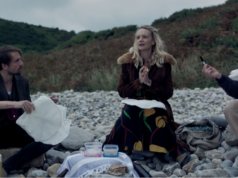The first half-hour of The Taste of Things is entirely taken up with the characters preparing a meal. First, a simple omelet for themselves: “I advise you to eat it with a spoon. It makes all the difference.” Then the real work begins for the honored guests dropping by their estate for dinner: seafood consommé, a vegetable vol-au-vent paired with a Puligny-Montrachet, turbot poached in milk paired with a Clos-Vougeot, seared veal loin with braised lettuce in a sauce Bourguignotte, and finally an omelette norvégienne — that’s a baked Alaska to you and me. The kitchen maid’s 13-year-old niece (Bonnie Chaigneau-Ravoire) who’s visiting for the day helps prepare the meal, and the master of the house stops to give her a spoonful of that sauce and ask her to identify the ingredients by taste. She names enough of them to mightily impress him, and me too.
Every ingredient, every step in each recipe is observed with the same care that the cooks use in preparing the food. In our American imaginations, this is how French people eat all the time. Never mind that actual French people, like us, get overwhelmed sometimes and head to McDonald’s. We like to think of them having this kind of relationship with their food, thinking through every element of their cuisine until a dish or a meal attains a peak of perfection. The master of the house flambés the baked Alaska tableside, and his guests sing the praises of the American scientist who discovered the meringue shell’s insulating powers that prevent the ice cream inside from melting. (The scientist was Benjamin Thompson, since you’re wondering.)
So it is with France’s entry into the foreign film Oscar race this past year. The movie did not snag a nomination, and now film fans are talking about how France hasn’t won that Oscar in 30 years. The Taste of Things is really too slight, and it would have been wrong if this film had broken the streak, especially in light of the films that did earn nominations. Yet it’s good enough to join the pantheon of all-time great food films. You know the ones I’m talking about: Babette’s Feast, Tampopo, Eat Drink Man Woman, Big Night, Like Water for Chocolate, Ratatouille. If you care at all about French food or food in general, you need to see this film as it opens locally this Valentine’s Day.
The story takes place in the Loire Valley in 1885, with Dodin Bouffant (Benoît Magimel) renowned locally for serving such excellent dinners. He passes plenty of credit on to his cook Eugénie (Juliette Binoche) and wants to marry her, but she doesn’t believe in marriage. We see during that opening sequence that she’s in failing health. That’s more or less it for the story. Magimel and Binoche were a real-life couple for some years and have a daughter together, and their offscreen chemistry particularly shows in their silent rapport in the kitchen, as the actors are actually cooking the dishes that we see.
Those dishes are the creations of Chef Pierre Gaignard, who also shows up onscreen as a chef who rattles off an interminable menu — his boss is a traveling Eurasian prince (Mhamed Arezki) who tries to overawe Dodin and his gourmet friends by serving them a banquet with course after course of meat stuffed with more meat and drowned in creamy sauces. (Returning from the eight-hour dinner, one of them says, “The prince’s generosity turned into an ordeal.”) Director/co-writer Trần Anh Hùng structures the story around meals, each one with its own character. When Eugénie’s illness worsens, Dodin tries to nurse her back to health by preparing a meal for her himself: split pea soup with edible flowers, oysters with breadcrumbs and caviar, a roast chicken stuffed with black truffles, and preserved pears with marrons glacés. We all should be so lucky.
Hùng made his name in the 1990s with his Vietnamese films The Scent of Green Papaya and The Vertical Ray of the Sun. His direction has never been flashy, and his gift for understatement fits his subject well here. Late in the film, his camera executes a remarkable 720-degree pan around Dodin’s empty kitchen to transition to a flashback. The shot encapsulates Trần Anh Hùng’s love letter to his adopted homeland and the pride the French take in their cuisine, always bearing tradition in mind but not afraid to innovate. It’s all enough to make me want to buy some short ribs and bacon and whip up a sauce Bourguignotte of my own.
The Taste of Things
Starring Juliette Binoche and Benoît Magimel. Directed by Trần Anh Hùng. Written by Marcel Rouff and Trần Anh Hùng. Rated PG-13.












